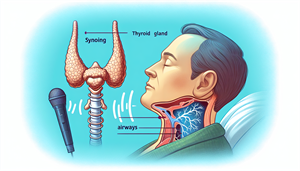
Understanding the Link Between Your Thyroid and Snoring
Your thyroid, a significant component of your endocrine system, generates hormones that control metabolism, body temperature, heartbeat, among other functions. When this gland is functioning optimally, the symphony of hormones it produces plays a harmonious tune. But when something goes awry, it can quickly turn into a cacophony of health issues, including, surprisingly, snoring. An enlarged thyroid can physically obstruct the airway, contributing to the symphony of snoring sounds. But the link between your thyroid and snoring doesn’t end there. Hypothyroidism, marked by insufficient thyroid activity, can contribute to snoring by causing your airway muscles to relax, raising their propensity to collapse.
The Role of Thyroid Hormones in Sleep Regulation
We often think of sleep as a passive state, but it’s a complex physiological process that’s closely regulated by a symphony of hormones, including those produced by your thyroid gland. In fact, thyroid hormones are essential for maintaining a balanced sleep-wake cycle and controlling your body’s circadian rhythm. Nevertheless, irregularities in these hormones can disrupt your sleep significantly. Hypothyroidism, characterized by decreased production of thyroid hormones, can impact the overall quality of your sleep. On the other hand, hyperthyroidism, characterized by an overproduction of these hormones, can also lead to sleep disturbances. Both conditions illustrate the impact of thyroid hormone imbalances on your peaceful slumber.
Enlarged Thyroid: A Physical Obstruction
An enlarged thyroid, medically known as a goiter, can be more than just an unsightly bulge in your neck. It can also be a contributing factor to your snoring by creating a physical obstruction in your airway. Moreover, an enlarged thyroid can cause severe sleep disruptions, like sleep apnea, a disorder that intermittently halts your breathing during sleep. Hashimoto’s disease, an autoimmune disorder that causes hypothyroidism, can also contribute to snoring and sleep apnea, making it a double whammy for your sleep quality.
Hypothyroidism and Airway Relaxation
While an enlarged thyroid physically obstructs your airway, hypothyroidism affects your snoring in a different way. This condition, characterized by inadequate production of thyroxine, can lead to relaxation of airway muscles, increasing their susceptibility to collapse and thus contributing to snoring. This condition puts those with a sluggish thyroid at an elevated risk of developing sleep apnea. In fact, approximately 40% of those with hypothyroidism potentially experience sleep apnea. So, if you’ve been experiencing loud snoring, it might be worth getting your thyroid checked.


